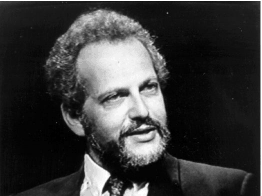 I am a psycholinguist by training, with lifelong interests in philosophy
and all aspects of human psychology. For the past few decades I've tried to make sense of
the role of conscious experience in the nervous system. I've conducted experimen- tal
studies of speech for 15 years, using a dozen different methods for eliciting laboratory
speech errors. Starting about 1980 I developed what is today the most extensive cognitive
account of consciousness. The brain implications of this approach, which turn out to be
sur- prisingly clear, have been explored in collaboration with ewman. This Fall
Oxford University Press is publishing my latest book, titled In the Theater of
Consciousness: The Workspace of the Mind. My most detailed scientific work is A
Cognitive Theory of Consciousness (1988; Cambridge University Press). Neuroscientific
work has been published in the 1993 CIBA Symposium on Consciousness, and in Concepts
in Neuroscience, 1993. I have lectured internationally in Britain, Denmark, Sweden,
Austria, Germany, Finland, Canada, the Netherlands, and at many universities in the US.
I am a psycholinguist by training, with lifelong interests in philosophy
and all aspects of human psychology. For the past few decades I've tried to make sense of
the role of conscious experience in the nervous system. I've conducted experimen- tal
studies of speech for 15 years, using a dozen different methods for eliciting laboratory
speech errors. Starting about 1980 I developed what is today the most extensive cognitive
account of consciousness. The brain implications of this approach, which turn out to be
sur- prisingly clear, have been explored in collaboration with ewman. This Fall
Oxford University Press is publishing my latest book, titled In the Theater of
Consciousness: The Workspace of the Mind. My most detailed scientific work is A
Cognitive Theory of Consciousness (1988; Cambridge University Press). Neuroscientific
work has been published in the 1993 CIBA Symposium on Consciousness, and in Concepts
in Neuroscience, 1993. I have lectured internationally in Britain, Denmark, Sweden,
Austria, Germany, Finland, Canada, the Netherlands, and at many universities in the US.
I am currently co-editor of an Academic Press journal called Consciousness & Cognition: An International Journal, the oldest specialized scientific journal on the subject (five years old!) and am founding President of the Association for the Scientific Study of Consciousness (ASSC). I work as Institute Faculty Professor at the Wright Institute in Berkeley, and was a Sloan Cognitive Science Scholar at UCSD in 1979-80 and a Visiting Scientist at the MacArthur Program on Conscious and Unconscious Mental Processes at UCSF in 1986. My wife Katharine McGovern is a fellow graduate student from the University of Minnesota. When time permits I like classical music (singing) as a hobby.
Summary of Baars' Global Workspace framework.
Evidence. First, we follow in William James' footsteps to ask, "What is it the distribution of consciousness across many different domains of reliable evidence?" We systematically lay out contrasts between well-established conscious phenomena --- such as mental events known to be attended, perceptual and informative --- and closely comparable unconscious phenomena, like those that are pre-perceptual, unattended, or habituated. By avoiding the most disputatious arguments and focusing on very clear, uncontroversial findings, we outline a solid body of evidence as a foundation for an integrated framework.
Theory. Many sources of evidence converge to show that consciousness reflects a basic architectural aspect of the nervous system --- a "global workspace" capacity in an otherwise mainly parallel and distributed set of neural functions. This architectural view helps to clarify many difficult questions, and allows us to incorporate other current hypotheses quite readily. It is really a modern version of the "theater hypothesis" of consciousness, which has a long history, going back to Plato's Allegory of the Cave and similar ideas in the Vedanta scriptures. The result is a surprising simplification of a great deal of evidence. Consciousness emerges as an essential adaptive aspect of the nervous system, a major biological fact, playing a number of indispensible roles in all psychological tasks. The conscious Global Workspace is a fundamentally integrative and holistic resource for the nervous system.
Wider implications. I believe that a comprehensive approach to conscious experience helps to bridge the perceived divide between science and the humane disciplines. It allows us to bridge those supposed polarities. Consciousness is not a just a deep scientific and philosophical issue, but has a direct bearing on the "humanization of science." A science that views consciousness as a foundation issue can no longer disavow the human dimension. Further, a better understanding of normal consciousness provides a basis for exploring extraordinary states, which have been central to the human quest for meaning as far back as we can know. Even at this early stage in our understanding I believe we can begin to develop informed hypotheses on these topics.
Contrary to popular opinion I believe scientific and metaphysical approaches to
human experience --- to the extent that they are truthful --- do not ultimately contradict
each other. But neither can they be subordinated to each other. They are aspects of a
larger unity.
